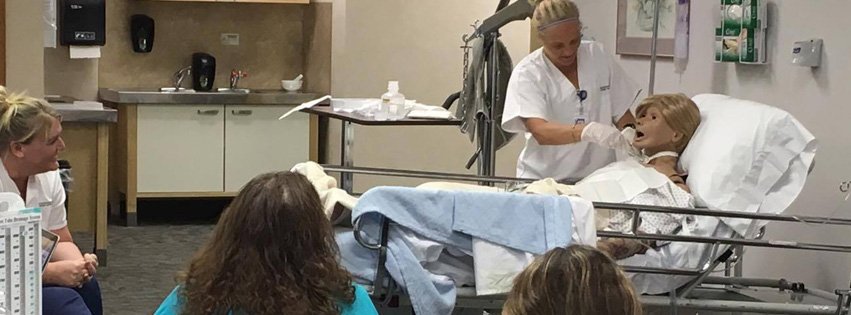First Day of Nursing School Lab: What to Expect
Learners in Ogden get hands-on experience with one of Nightingale College’s simulation mannequins during their nursing school lab experience.
As you prepare to get back into the flow of school and prepare for new learner orientation, it is easy to underestimate all the activities that are involved in nursing school. Besides logging in to your class lectures online, on-ground labs and clinicals are part of the course. Prepping for the online portion of classes is not very complicated; however, preparing for nursing school labs and clinicals can throw you off guard. What is to be expected? Fortunately, you are not the first learner to ponder the question of what to expect your first day of simulation lab.
Nursing school centers around learning how to manage and monitor patients’ health, which comes with developing the necessary skills that go beyond lectures and class discussions. Simulation lab helps learners practice real-world situations on low-, medium-, and high-fidelity mannequins with the guidance of an instructor. It is the opportunity for learners to practice hands-on patient care in a safe environment to learn about taking the proper action when the patient’s health takes a turn for the worse.
As intimidating as it can be to realize you are going to be learning how to manage someone’s health, stay calm and realize that the hands-on instruction you are learning is crucial to developing the skills and knowledge that are required to take care of a patient’s well-being.
It is important to take simulation lab very seriously and imagine yourself working on a real patient as opposed to a mannequin. Instructors will sit back, analyze you as you practice specific skills in treatment, and be attentive to the actions you take to address the health concerns of the patient. For example, when your patient (the mannequin) starts turning blue, you will need to assess why and make the right actions to prevent the patient’s health from declining by talking it through as you fulfill the task.
Simulation lab is not a time to slack off. Take simulation labs very seriously. You will be handling real patients in your clinical experiences.
On your first day of labs, don’t get too overwhelmed. But you should be fully prepared. Here’s what you need to keep in mind to be ready for your first day of clinicals:
- Dress like a nurse. Remember to wear your Nightingale College uniform. The College provides scrubs to every learner for good reason. Show up to labs in your uniform and adhere to the other guidelines set for attending labs. No learner should show up in scrubs other than the approved Nightingale College learner scrubs. Additionally, learners are required to show up to lab (and clinicals) with scrubs that are neatly laundered and ironed. Wrinkly, dirty scrubs are never acceptable, especially for nurses.
- You’re in school. Where are your school materials? Bring your computer, notebook, and pen to lab to follow presentations on your computer and to capture important information. The notebook and pen ensure that you can easily jot down notes throughout lab so you aren’t wasting time typing or annoying a fellow nursing learner with your excessive typing. Part of lab is getting up and watching simulations done by the instructor or waiting in line behind fellow classmates to practice on the mannequin. Jot down notes as the instructor talks through the process and is aiding other learners. You can learn quite a bit from listening intently while the instructor is advising other learners.
- Be conscious of time and respect the time of others. Being on time is important to any career. Make it a priority to be at your scheduled lab on time so you don’t run in late and miss important information. Respecting others’ time helps create a collaborative environment where learning reaches new heights. Do your best to not detain the class from starting.
- It is a time to ask questions. If there were any time to pose a question in nursing school, it would be in simulation lab. Never hold back a question when it comes to a patient’s health. Often, registered nurses fear asking doctors for clarifications regarding a patient’s treatment; this is where mistakes happen. Learn to ask questions if you are unsure about the task at hand. However, learn to ask questions directly and quickly. The health care environment is fast paced and there is no time to stumble around a question.
- You’re a nurse. Bring your nursing equipment like your stethoscope and learner ID badge. Enough said.
Simulation lab is a fun experience that allows you to finally practice care as opposed to read about it in your class materials. It is the part of the class that you gain the most experience from as you should always think in terms of action, not facts. Join your classmates in lab with a positive attitude. Simulation lab lasts a few hours and torpedoing the environment with negativity may keep other classmates from paying attention and positively engaging in the activities and post-lab discussions. Not to mention, your future patients will appreciate a positive and upbeat attitude.


